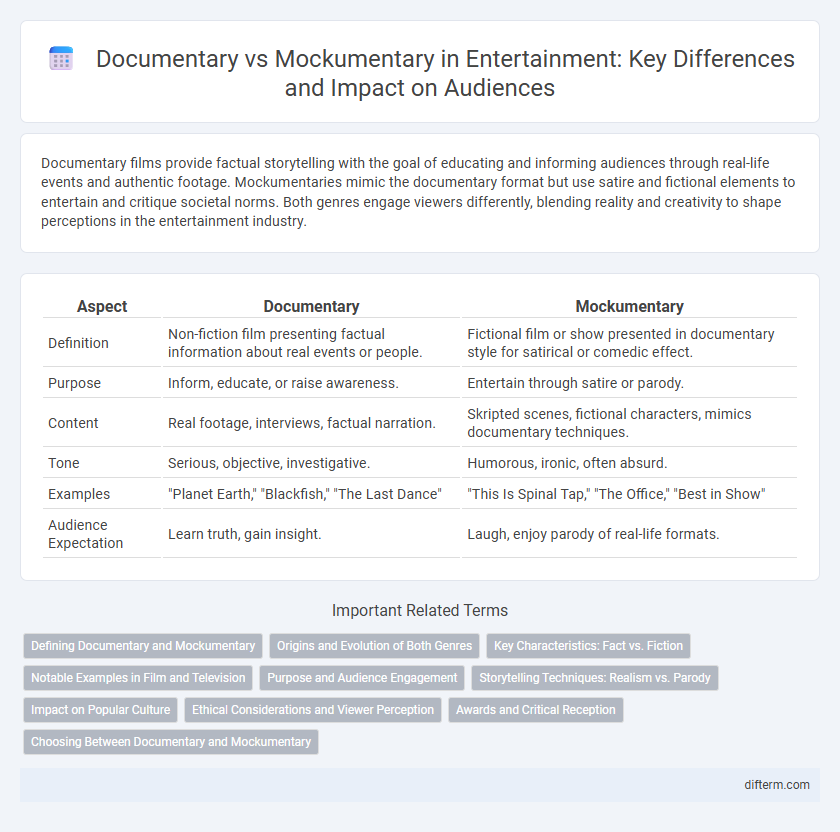Documentary films provide factual storytelling with the goal of educating and informing audiences through real-life events and authentic footage. Mockumentaries mimic the documentary format but use satire and fictional elements to entertain and critique societal norms. Both genres engage viewers differently, blending reality and creativity to shape perceptions in the entertainment industry.
Table of Comparison
| Aspect | Documentary | Mockumentary |
|---|---|---|
| Definition | Non-fiction film presenting factual information about real events or people. | Fictional film or show presented in documentary style for satirical or comedic effect. |
| Purpose | Inform, educate, or raise awareness. | Entertain through satire or parody. |
| Content | Real footage, interviews, factual narration. | Skripted scenes, fictional characters, mimics documentary techniques. |
| Tone | Serious, objective, investigative. | Humorous, ironic, often absurd. |
| Examples | "Planet Earth," "Blackfish," "The Last Dance" | "This Is Spinal Tap," "The Office," "Best in Show" |
| Audience Expectation | Learn truth, gain insight. | Laugh, enjoy parody of real-life formats. |
Defining Documentary and Mockumentary
Documentary films present factual, real-life events with the intention to inform or educate audiences by using authentic footage, interviews, and evidence-based storytelling. Mockumentaries, on the other hand, mimic the style and format of documentaries but use fictional narratives and satirical elements to entertain and critique social issues. Understanding the distinction between documentary and mockumentary is crucial for appreciating their unique roles in the entertainment industry.
Origins and Evolution of Both Genres
Documentaries originate in the early 20th century as factual films aiming to educate and inform audiences with real-life events and authentic footage. Mockumentaries evolved later, gaining traction in the late 20th century by adopting documentary-style techniques to deliver fictional and satirical narratives. Both genres reflect changing audience tastes, with documentaries emphasizing realism and mockumentaries blending humor and critique through parody.
Key Characteristics: Fact vs. Fiction
Documentary films emphasize factual storytelling, featuring real events, authentic interviews, and actual footage to inform and educate viewers. Mockumentaries blend fictional narratives with a documentary style, using satire and parody to entertain while mimicking traditional documentary techniques. The key distinction lies in documentaries' commitment to truth, whereas mockumentaries prioritize creative storytelling through fabricated scenarios.
Notable Examples in Film and Television
Notable examples of documentaries include "Planet Earth," which showcases real wildlife footage, and "The Last Dance," detailing Michael Jordan's basketball career. In contrast, mockumentaries like "This Is Spinal Tap" and the television series "The Office" use fictional narratives presented in a documentary style for comedic effect. These formats highlight the difference between factual storytelling and satirical, scripted content in entertainment media.
Purpose and Audience Engagement
Documentaries aim to inform and educate audiences by presenting factual information and real-life events, fostering a deeper understanding of the subject matter. Mockumentaries use satire and humor to entertain while often critiquing social norms, engaging viewers through parody and irony rather than factual accuracy. Audience engagement in documentaries hinges on credibility and emotional connection, whereas mockumentaries rely on comedic timing and relatable absurdity to maintain interest.
Storytelling Techniques: Realism vs. Parody
Documentaries employ storytelling techniques grounded in realism, using authentic footage, interviews, and factual narration to present genuine events and information. Mockumentaries leverage parody by mimicking documentary styles, incorporating scripted humor and exaggerated characters to satirize real-life subjects or cultural phenomena. The contrast between these genres lies in their purpose: documentaries aim to inform and educate, while mockumentaries prioritize entertainment through comedic storytelling.
Impact on Popular Culture
Documentaries provide authentic insights into real events and have shaped popular culture by educating audiences and influencing public opinion on social, political, and environmental issues. Mockumentaries entertain by parodying traditional documentary styles, often highlighting societal quirks and satirizing media conventions, which has introduced a new genre blending humor with critical commentary. Both formats have significantly impacted popular culture by shaping audience expectations and expanding the ways stories are told in visual media.
Ethical Considerations and Viewer Perception
Documentaries prioritize factual accuracy and ethical representation, aiming to inform viewers with truthful content, whereas mockumentaries blend fiction with reality, often challenging viewers' ability to discern authenticity. Ethical considerations in documentaries involve obtaining informed consent and portraying subjects respectfully, while mockumentaries risk misleading audiences due to their satirical or fictionalized nature. Viewer perception varies as documentaries are trusted for education, whereas mockumentaries evoke skepticism and critical thinking, prompting audiences to question the boundary between fact and fiction.
Awards and Critical Reception
Documentaries often receive prestigious awards such as the Academy Award for Best Documentary Feature, highlighting their factual storytelling and impact on social awareness. Mockumentaries, while less frequently recognized in traditional award circuits, garner critical acclaim for their satire and innovative narrative style, often praised in comedy and film festival categories. Both formats contribute uniquely to entertainment by blending reality and fiction, influencing audience perceptions and critical discussions.
Choosing Between Documentary and Mockumentary
Choosing between documentary and mockumentary depends on the desired tone and purpose of the project. Documentaries aim to present factual, in-depth exploration of real events or subjects, appealing to audiences seeking authentic information and educational content. Mockumentaries use satire and fictional elements to entertain while often providing social commentary, attracting viewers who enjoy humor and creative storytelling.
documentary vs mockumentary Infographic

 difterm.com
difterm.com